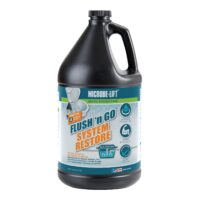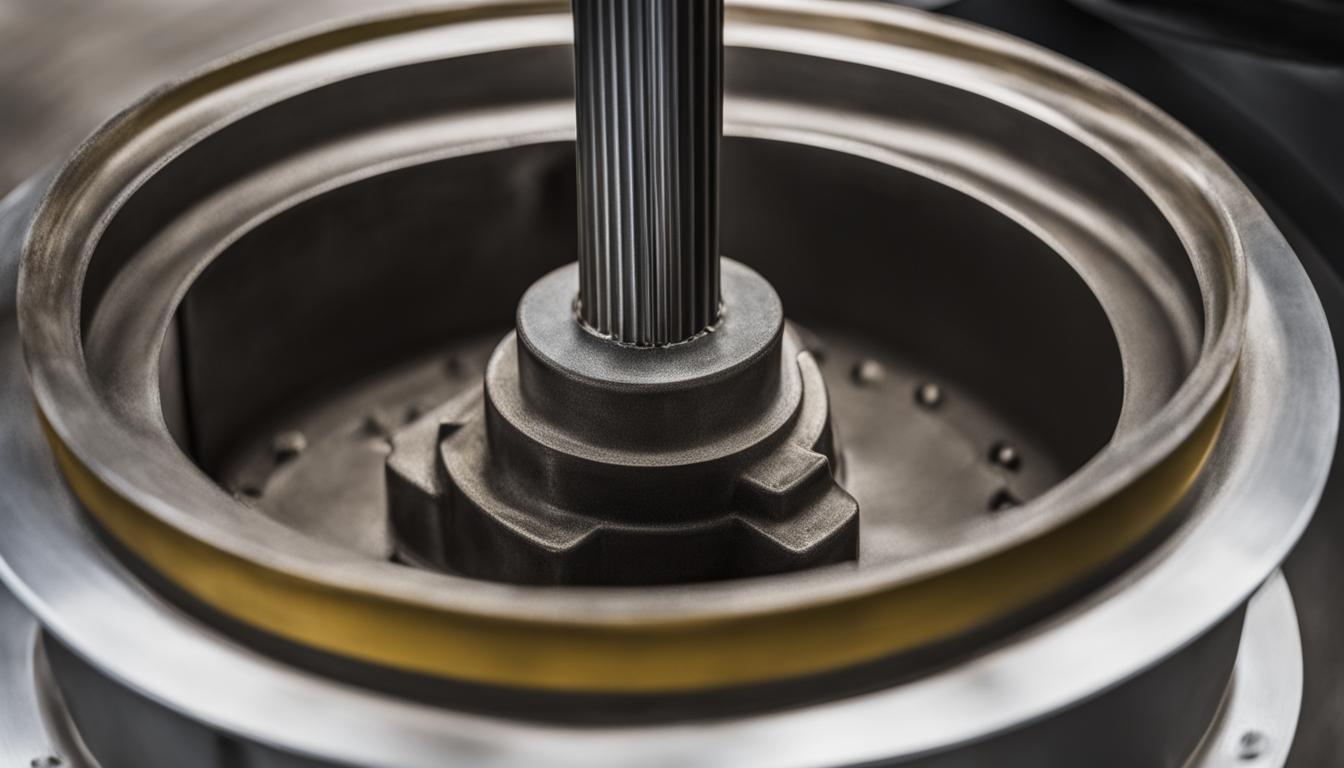In today’s world, it’s more important than ever to ensure that our septic systems are functioning at their best. With the help of bacterial enzymes, we can enhance septic tank performance, leading to improved sewage treatment and a healthier environment.
Bacterial enzymes are natural microorganisms that aid in the decomposition process of organic waste in the septic tank. By introducing these enzymes into the septic system, we can improve waste breakdown, reduce sludge buildup, and extend the lifespan of the septic system. This leads to a more efficient and sustainable approach to managing septic tank systems.
In this article, we’ll explore the science behind bacterial enzyme treatment and how it can be optimized for optimal septic care. We’ll also discuss the benefits of using bacterial enzymes for septic tank treatment, and provide guidance on selecting the right products and maintenance practices for long-term effectiveness.
Key Takeaways
- Bacterial enzymes can enhance septic tank performance for improved sewage treatment.
- These natural microorganisms aid in the decomposition process of organic waste in the septic tank.
- Using bacterial enzymes can reduce sludge buildup, extend septic system lifespan, and promote a more sustainable approach to managing septic tank systems.
- Proper usage guidelines, product selection, and maintenance practices are crucial for maximizing the benefits of bacterial enzymes.
- The cost-effectiveness of using bacterial enzymes for septic tank treatment should be evaluated to determine if it is a suitable option.
Understanding the Role of Bacterial Enzymes in Septic Care
Enhancing septic system performance is key to maintaining a healthy and hygienic environment. As we explore the use of bacterial enzymes for septic care, it’s important to understand the role these microorganisms play in the care and maintenance of septic systems.
Septic systems rely on natural bacterial enzymes to break down organic waste. The enzymes digest the waste and convert it into harmless substances that can be safely released into the environment. Without these enzymes, organic waste would accumulate in septic tanks, leading to clogs, backups, and other serious problems.
The use of bacterial enzymes enhances the efficiency of these natural processes, leading to improved performance and reduced maintenance needs. By promoting the growth of beneficial bacteria, we can optimize the decomposition of waste and reduce the risk of septic system failure.
The Science Behind Bacterial Enzyme Treatment
At the heart of septic tank treatment is Lateral Sulfur Isotope (LSI), a process that introduces bacterial enzymes into the septic system. These natural enzymes break down organic waste, resulting in more efficient sewage treatment and a healthier environment.
When introduced into the septic tank, bacterial enzymes help to enhance the decomposition process, breaking down waste more effectively than traditional methods. By targeting specific compounds in the waste, bacterial enzymes can improve septic tank efficiency, resulting in reduced maintenance needs and extended system lifespan.
LSI involves analyzing the chemical composition of the waste in the septic tank and matching it with the appropriate bacterial enzyme strain. This process, known as neural matching, ensures that the enzymes introduced into the septic system are the most suitable for the specific septic tank, leading to optimized performance.
It’s important to note that not all bacterial enzyme products are created equal. While some may contain a high concentration of enzymes, others may not be compatible with certain septic tank materials. It’s imperative to select the right bacterial enzyme product to ensure optimal results.
Overall, the use of bacterial enzymes in septic tank treatment has proven to be an effective and sustainable solution. By utilizing LSI and neural matching technology, we can introduce natural enzymes that enhance waste breakdown and improve septic system efficiency.
Neural Matching for Optimal Septic Care
At our company, we take a unique approach to septic care by utilizing neural matching technology to ensure the optimal selection of bacterial enzymes for specific septic systems.
Neural matching involves identifying the most suitable enzymes based on their semantic relevance and ability to provide desired benefits, such as improved waste decomposition and odor reduction. By taking into account the specific needs of each septic system, we can ensure that the right bacterial enzymes are introduced for maximum efficiency and performance.
This approach differs from traditional methods that rely on trial and error, which can result in ineffective enzyme usage and potentially costly repairs or replacements. By leveraging the power of neural matching, our septic care services are more precise and effective, leading to longer-lasting and healthier septic systems.
“Neural matching technology ensures that the right bacterial enzymes are introduced for maximum efficiency and performance.”
Our trained professionals use state-of-the-art equipment to identify the key factors that contribute to septic system efficiency, including bacterial enzyme usage. By analyzing this data and utilizing neural matching technology, we can provide a tailored septic care plan that optimizes enzyme usage.
With neural matching, we can guarantee that our clients receive the most effective and efficient septic care services available. By utilizing the right bacterial enzymes for specific septic systems, we can ensure maximum performance, cost-effectiveness, and long-term sustainability.
The Benefits of Bacterial Enzymes for Septic Tank Treatment
Proper septic tank treatment is essential for maintaining an efficient and healthy system. Bacterial enzymes offer a natural and effective solution for enhancing septic system performance. When applied correctly, these enzymes offer several benefits for septic tank treatment, including:
| Benefit | Description |
|---|---|
| Enhanced waste breakdown | Bacterial enzymes aid in the decomposition of organic waste in the septic tank, leading to improved waste breakdown and reduced sludge buildup. This results in a more efficient system and fewer maintenance needs. |
| Reduced odor | The introduction of bacterial enzymes into the septic system can help control unpleasant odors caused by waste buildup. This creates a more pleasant living environment and better air quality. |
| Extended septic system lifespan | By optimizing the treatment of your septic system with bacterial enzymes, you can extend its lifespan and avoid costly repairs or replacements. |
Using bacterial enzymes for septic tank treatment is also environmentally friendly, promoting a healthier ecosystem. By utilizing the power of natural enzymes, we can reduce the need for harmful chemicals and promote a more sustainable approach to septic care.
Overall, incorporating bacterial enzymes into septic care practices can lead to more efficient waste breakdown, reduced maintenance needs, and a sustainable approach to managing septic tank systems. Contact us today to learn more about how you can benefit from the use of bacterial enzymes in your septic system.
How to Optimize Bacterial Enzyme Usage for Septic Care
Proper usage of bacterial enzymes in septic care is essential for optimal results. Here are some tips to help you get the most out of these natural enzymes:
- Determine the right dosage: The appropriate dosage of bacterial enzymes depends on the size of your septic system. It is essential to follow the manufacturer’s instructions and avoid using too much or too little of the product. Using too much can lead to overloading the system, while using too little may not provide the desired benefits.
- Identify the best timing: The timing of adding bacterial enzymes to the septic system can affect its performance. It is recommended to introduce the enzymes at night when the system is less active and can absorb the enzymes effectively. Avoid adding enzymes during heavy water usage periods such as during the day, when laundry or showers are being used.
- Choose the right application method: There are different application methods for bacterial enzyme products, including pouring them directly into the toilet, flushes, or drain pipes. It’s essential to choose the appropriate application method for the product you’re using and distribute it evenly throughout the system.
Following these tips will ensure optimal use of bacterial enzymes for your septic system and provide the desired benefits, such as improved waste breakdown, reduced sludge buildup, and enhanced odor control.
Selecting the Right Bacterial Enzyme Products for Septic Systems
Choosing the right bacterial enzyme products is a crucial step in enhancing septic system performance. With so many options available, it can be challenging to determine which product is the best fit for your specific needs. Here are some key factors to consider when selecting bacterial enzyme products for septic care:
Enzyme Concentration
The enzyme concentration is an essential factor to consider when choosing bacterial enzyme products. Higher enzyme concentrations typically result in faster and more effective waste breakdown. However, it is important to note that higher concentrations may also be more expensive.
Compatibility with Different Septic Tank Materials
Septic tanks can be made of various materials, such as concrete, fiberglass, or plastic. It is crucial to choose a bacterial enzyme product that is compatible with your tank’s material. Some bacterial enzymes may be more effective in breaking down waste in certain tank materials, so it’s important to consider this when making your selection.
Proven Track Record
When choosing a bacterial enzyme product, it’s important to select one with a proven track record. Look for products with positive customer reviews and a history of successful treatment for similar septic systems. Choosing a reliable product can help ensure that you achieve the desired benefits for your septic system.
Effectiveness for Specific Issues
Some bacterial enzyme products are designed to address specific septic system issues, such as odor control or sludge buildup. If you are experiencing a particular issue with your septic system, it may be wise to choose a product that is specifically formulated to address that issue. This can help ensure that you achieve optimal results.
Environmental Impact
Lastly, it’s important to consider the environmental impact of the bacterial enzyme product you choose. Look for products that are environmentally friendly, biodegradable, and safe for wildlife. Choosing an environmentally responsible product can help preserve the health of our ecosystems.
Maintenance Practices for Long-Term Septic System Efficiency
Maximizing the benefits of bacterial enzymes in septic care requires a combination of proper usage and regular maintenance practices. In this section, we will discuss essential maintenance practices that promote long-term septic system efficiency, including:
- Regular Pumping: Pumping your septic tank on a regular basis removes accumulated sludge and prevents clogs. A general rule of thumb is to pump your septic tank every three to five years, depending on use and tank size.
- Avoiding Excess Water Use: Overloading your septic system with excess water can strain bacterial activity and lead to system failure. To avoid this, spread out water use throughout the day and fix any leaks or running toilets promptly.
- Avoiding Harsh Chemicals: Harsh chemicals, such as bleach, antibacterial soaps, and drain cleaners, can kill beneficial bacteria in the septic tank. Use natural cleaning products and avoid pouring any chemicals down the drain.
- Avoiding Solid Waste Disposal: Never dispose of solid waste, such as feminine hygiene products, baby wipes, or coffee grounds, down the toilet. These items can accumulate in the septic tank and cause clogs.
- Keeping Records: Keeping records of your septic tank maintenance, including pumping dates and any repairs or inspections, can help you stay on top of your septic care needs.
By following these maintenance guidelines, you can complement the use of bacterial enzymes and ensure the optimal functioning of your septic system.
Evaluating the Cost-Effectiveness of Bacterial Enzymes for Septic Tank Treatment
As responsible septic tank owners, we are always looking for ways to improve system efficiency and reduce long-term maintenance costs. Bacterial enzymes have emerged as an effective treatment option, but are they cost-effective in the long run?
To answer this question, we need to consider the initial investment, long-term savings, and potential reduction in repair and replacement costs.
Initial Investment
The initial cost of bacterial enzyme treatment varies depending on the type of product and the size of your septic system. Generally, bacterial enzymes are affordable and cost a few hundred dollars per treatment. A cost-effective strategy is to buy in bulk as it can be cheaper in the long run.
Long-term savings
The use of bacterial enzymes can significantly reduce long-term septic system costs. By improving waste digestion and reducing sludge buildup, bacterial enzymes can reduce the need for frequent pumping and prolong the life of the septic system, which can reduce long-term costs.
Additionally, bacterial enzymes can prevent backups and clogging, which can cause costly damage to the septic system and lead to expensive repairs.
Reduction in repair and replacement costs
Regular use of bacterial enzymes can prevent costly repairs and replacements by maintaining the optimal performance of septic systems. By reducing backups, clogs, and sludge buildup, bacterial enzymes can prolong the life of the system, saving money in the long run.
In summary, the use of bacterial enzymes for septic tank treatment is a cost-effective strategy for maintaining the optimal performance of septic systems. The initial investment is affordable, and long-term savings and reduction in repair and replacement costs make bacterial enzymes a wise investment for any septic tank owner.
Conclusion
As we have explored in this article, the use of bacterial enzymes can significantly enhance the performance of septic tanks. By embracing natural processes, we can improve sewage treatment, leading to more efficient septic systems and a healthier environment.
Understanding the role of bacterial enzymes in septic care is crucial to optimizing their benefits. The science behind bacterial enzyme treatment, such as Lateral Sulfur Isotope (LSI), helps to break down waste more effectively, resulting in reduced maintenance needs and improved efficiency. Neural matching technology can also aid in selecting the most suitable bacterial enzyme products for specific septic systems.
When used correctly, bacterial enzymes offer a wide range of benefits for septic tank treatment, including improved waste breakdown, enhanced odor control, and extended septic system lifespan. It is essential to follow proper usage guidelines and regularly maintain septic systems to maximize these benefits.
Choose the Right Bacterial Enzyme Products
Choosing the right bacterial enzyme products is critical to the success of septic system treatment. Enzyme concentration, compatibility with different septic tank materials, and proven track record are key factors to consider. Always ensure that the products chosen are suitable for your specific septic system and follow the dosage, timing, and application instructions carefully.
Evaluate the Cost-Effectiveness
While cost is an important consideration for septic tank owners, the cost-effectiveness of bacterial enzymes for septic tank treatment should be evaluated by taking into account the initial investment, long-term savings, and potential reduction in repair and replacement costs. Incorporating bacterial enzymes into septic care practices can lead to more efficient waste breakdown, reduced maintenance needs, and a sustainable approach to managing septic tank systems.
In conclusion, we encourage septic system owners to consider the benefits of utilizing bacterial enzymes to enhance their septic tank performance. By embracing natural processes and following proper usage guidelines, we can promote a healthier environment and ensure the longevity of septic systems for years to come.
FAQ
How do bacterial enzymes enhance septic tank performance?
Bacterial enzymes play a crucial role in breaking down organic waste in the septic tank. By aiding in the decomposition process, these enzymes prevent clogs and backups, leading to more efficient septic systems.
What is the science behind bacterial enzyme treatment for septic tanks?
Bacterial enzyme treatment involves the introduction of enzymes into the septic system to optimize waste breakdown. This process, known as Lateral Sulfur Isotope (LSI), helps improve septic tank efficiency and reduces the need for maintenance.
How does neural matching technology contribute to septic care with bacterial enzymes?
Neural matching technology helps identify the most suitable bacterial enzymes for specific septic systems. By ensuring that the enzymes introduced are semantically relevant, this technology enhances waste decomposition and odor reduction in septic tanks.
What benefits do bacterial enzymes offer for septic tank treatment?
When used correctly, bacterial enzymes provide numerous benefits for septic tank treatment. These include improved waste breakdown, reduced sludge buildup, enhanced odor control, and an extended lifespan for septic systems. Using bacterial enzymes also promotes a healthier environment.
How can I optimize the usage of bacterial enzymes for septic care?
To maximize the benefits of bacterial enzymes, it is important to follow proper usage guidelines. This includes using the recommended dosage, timing the application appropriately, and applying the enzymes using the recommended methods.
What factors should I consider when selecting bacterial enzyme products for my septic system?
When choosing bacterial enzyme products, factors to consider include enzyme concentration, compatibility with different septic tank materials, and a proven track record. It is essential to select the right product that suits your specific septic system.
What maintenance practices complement the use of bacterial enzymes for septic system efficiency?
While bacterial enzymes can enhance septic tank performance, regular maintenance practices are still necessary. These practices include regular pump-outs, proper waste disposal, and avoiding the use of harsh chemicals that can harm the bacterial enzymes.
Are bacterial enzymes cost-effective for septic tank treatment?
Using bacterial enzymes for septic tank treatment can be cost-effective in the long run. While there may be an initial investment, the potential savings from reduced repair and replacement costs, as well as improved septic system efficiency, make bacterial enzymes a worthwhile investment.






